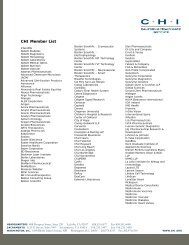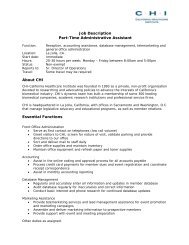California Biomedical Industry - California Healthcare Institute
California Biomedical Industry - California Healthcare Institute
California Biomedical Industry - California Healthcare Institute
You also want an ePaper? Increase the reach of your titles
YUMPU automatically turns print PDFs into web optimized ePapers that Google loves.
UC Merced: Addressing healthcare disparitiesImmunology andmicrobiology major AparnaPasumarthi wants to makesure the world-class researchconducted in the labs atthe University of <strong>California</strong>,Merced, is applied in waysthat improve people’s lives.“Research is a powerful tool in learningabout the various health disparities thatexist in the community,” Pasumarthisaid. “It provides an opportunity tocollect presentable data to help bridgegaps between the scientific society andthe local community.”Pasumarthi, of Fremont, is one of 10undergraduate students conductingresearch through the Center ofExcellence for the Study of HealthDisparities in Rural and EthnicUnderserved Populations. The centerwas established with a grant given toUC Merced in September 2009 by theNIH’s National Center on MinorityHealth and Health Disparities.The center’s goal is to increase thenumber of UC Merced students whoare knowledgeable about disparitiesin healthcare and health outcomes,improve the number of students fromunder-represented and disadvantagedgroups performing research in thisarea, and expand the capacity of theuniversity to conduct health sciencesresearch that addresses disparities thisregion.The center has four main components.There is a program for graduatestudents to share their knowledgewith community groups, a programfor undergraduates to do hands-onresearch with professors, a speakerseries to engage community membersabout health issues and a minor onpublic health and health disparities.Pasumarthi immediately wanted to jointhe center after she learned about it in aclass. She was drawn to the opportunityof doing research that could also servethe community. She joined the lab ofProfessor Jinah Choi, who is studyinghepatitis C.“We can shape the future of the UC andserve the community,” Choi explained.Hepatitis C is blood borne andmost often transmitted throughcontaminated needles, though it canalso be passed through unprotectedsex. The virus, first discovered in 1987,does not directly cause liver cancer.Instead, it causes a chronic infection,which over time causes cirrhosis of theliver and damages a person’s DNA.Overtime, that damaged DNA may leadto mutations and cancerous cells in theliver. A person can carry hepatitis C foryears without knowing it.Choi is looking for ways to limit virusreplication or at least the virus’ abilityto ultimately cause cancer. Antioxidantscan reduce oxidation and DNA damage,but they are not likely to be as effectivewhen consumed in food, drinks orsupplements. Choi said one optioncould be directly inhibiting the sourceof oxidants in the infected cell, makingits effect more potent. In the paper inHepatology, Choi described a sourceof oxidants that can be targeted by apharmacological approach.Another option is to increase theefficacy of antiviral drugs or facilitatethe development of a vaccine thatprevents someone from receiving thevirus or blocks it from replicating.Choi recently published a paper abouther research in Hepatology, the leadingjournal in the field of liver disease.“It is really exciting that all the piecesare coming together,” Choi said.“Whatever we find in the lab hasconsequences. It has the potential toreally impact people.”<strong>California</strong> <strong>Biomedical</strong> <strong>Industry</strong> 2011 Report | 89






